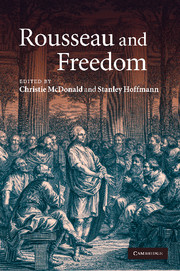Introduction
Published online by Cambridge University Press: 05 May 2010
Summary
This book began with the sense that freedom, one of the longest-standing ideals in the West, is in today's world increasingly compromised and a subject for deep concern; revisiting the past, and thereby bringing it into the present, can provide a means of reflecting on this issue beyond the soundbite. Debates about freedom were first set out in their modern version by Jean-Jacques Rousseau, who sought to investigate the relationship between freedom and equality in two potentially conflicting arenas: that of humankind and that of citizen. His ideas and analyses were taken up during the philosophical Enlightenment, were often invoked during the French Revolution, and still resonate, we believe, in contemporary discussions of freedom.
In English we use the words “freedom” and “liberty” interchangeably. Rousseau received the word and concept of liberté as it had developed from the Greek eleutheria and the Latin libertas (“freedom”) libertus (“freedman”). The political sense of freedom, how much or how little should be allowed, goes back to the Greeks, as do questions of social dependence and about inner freedom as a means to happiness. The meaning of the related words libertin and libertinage in French, derived from libertinus (“pertaining to a freedman”), evolved from “freed slave” to one who indulges in excessive freedom concerning religious matters and, later, to intellectual and sexual freedom; Rousseau brings all of these meanings into play within different contexts.
- Type
- Chapter
- Information
- Rousseau and Freedom , pp. 1 - 6Publisher: Cambridge University PressPrint publication year: 2010



